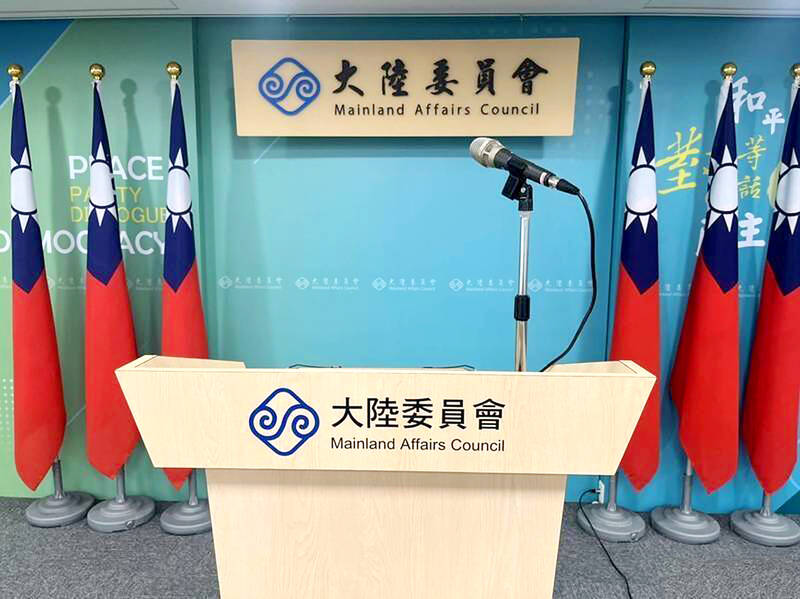The Mainland Affairs Council (MAC) yesterday welcomed an announcement by Chinese authorities on their plan to resume group travel to Taiwan for residents of Shanghai and its Fujian Province.
“The [Taiwanese] government welcomes Chinese tourists to visit Taiwan,” the MAC said in a statement.
“However, the specifics of implementation are still pending the Chinese authorities’ announcement of specific measures,” the council said.

Photo: Chen Yu-fu, Taipei Times
The MAC also urged Chinese authorities to open communications on issues related to tourism safety, quality control and stability with Taiwan through the Taiwan Strait Tourism Association (TSTA) and the Association For Tourism Exchange Across The Taiwan Straits (ATETS).
“This will help ensure the smooth resumption of tourism exchanges in the future,” the council said.
The TSTA and ATETS were established by Taipei and Beijing respectively to facilitate coordination and negotiations between the two sides on tourism.
The MAC’s statement came in response to an announcement made by China’s Ministry of Culture and Tourism early yesterday, in which it said China’s government would “soon resume group travel to Taiwan for residents of Fujian Province and Shanghai.”
The purpose of the resumption is to “further promote the normalization of interactions between individuals across the Taiwan Strait and the regularization of [cross-strait] exchanges in various fields,” the Chinese Ministry of Culture and Tourism said.
It was also aimed at responding to the “strong expectations” of grassroots communities and the tourism industry in Taiwan, it said.
The Chinese ministry said it hopes the tourism sectors on both sides would strengthen communication and coordination to provide high-quality services and products for Chinese residents visiting Taiwan as part of group tours, it added without elaborating about what communication it foresaw.
China only allows Fujian residents to visit Kinmen and Lienchiang counties, but not other cities or counties in Taiwan proper.
Taipei last year raised its travel warning for China to “orange,” advising Taiwanese against nonessential trips, following a threat for Beijing to execute “diehard” Taiwan independence supporters.
China’s Taiwan Affairs Office yesterday said that Taipei should cancel the travel warning and fully resume all direct travel links across the Taiwan Strait.
Additional reporting by Reuters

The Ministry of Economic Affairs has fined Taobao NT$1.2 million (US$36,912) for advertisements that exceed its approved business scope, requiring the Chinese e-commerce platform to make corrections in the first half of this year or its license may be revoked. Lawmakers have called for stricter enforcement of Chinese e-commerce platforms and measures to prevent China from laundering its goods through Taiwan in response to US President Donald Trump’s heavy tariffs on China. The Legislative Yuan’s Finance Committee met today to discuss policies to prevent China from dumping goods in Taiwan, inviting government agencies to report. Democratic Progressive Party Legislator Kuo Kuo-wen (郭國文) said

The Ministry of Economic Affairs has fined Taobao NT$1.2 million (US$36,900) for advertisements that exceeded its approved business scope and ordered the Chinese e-commerce platform to make corrections in the first half of this year or its license would be revoked. Lawmakers have called for stricter supervision of Chinese e-commerce platforms and more stringent measures to prevent China from laundering its goods through Taiwan as US President Donald Trump’s administration cracks down on origin laundering. The legislature’s Finance Committee yesterday met to discuss policies to prevent China from dumping goods in Taiwan, inviting government agencies to report on the matter. Democratic Progressive Party

Taiwan and its Pacific ally Tuvalu on Tuesday signed two accords aimed at facilitating bilateral cooperation on labor affairs, according to Taiwan’s Ministry of Foreign Affairs (MOFA). The governments inked two agreements in Taipei, witnessed by Foreign Minister Lin Chia-lung (林佳龍) and visiting Deputy Tuvaluan Prime Minister Panapasi Nelesone, MOFA said in a news release. According to MOFA, the agreements will facilitate cooperation on labor issues and allow the two sides to mutually recognize seafarers’ certificates and related training. Taiwan would also continue to collaborate with Tuvalu across various fields to promote economic prosperity as well as the well-being of their

Sung Chien-liang (宋建樑), who led efforts to recall Democratic Progressive Party (DPP) Legislator Lee Kun-cheng (李坤城), was released on bail of NT$80,000 today amid outcry over his decision to wear a Nazi armband to questioning the night before. Sung arrived at the New Taipei District Prosecutors’ Office for questioning in a recall petition forgery case last night wearing a red armband bearing a swastika, carrying a copy of Adolf Hitler’s Mein Kampf and giving a Nazi salute. Sung left the building at 1:15am without the armband and covering the book with his coat. Lee said today that this is a serious